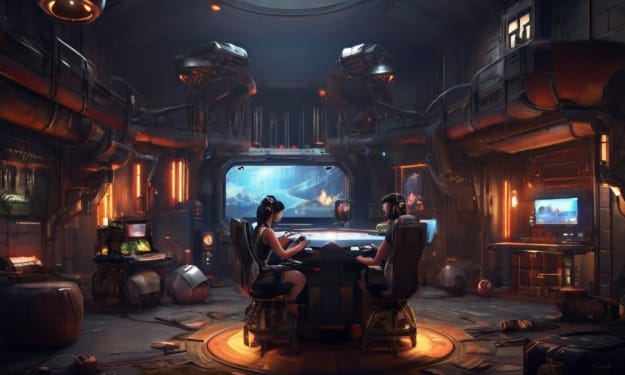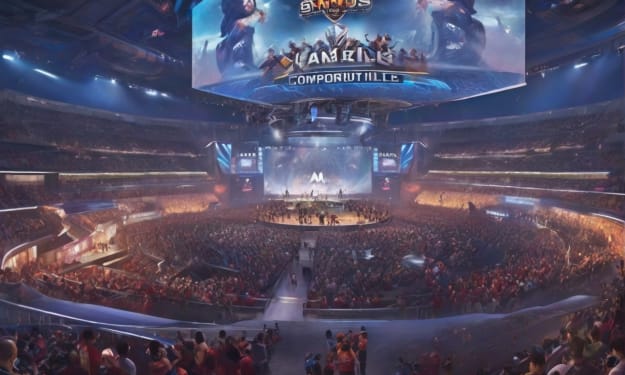"The Rise of Technology and Gaming: A Look at the Future of Entertainment"
"How Virtual Reality and Artificial Intelligence are Changing the Way We Play and Interact"

Technology has come a long way in recent years, and the gaming industry has been at the forefront of this revolution. With the rise of virtual reality (VR) and artificial intelligence (AI), the future of gaming is looking more exciting than ever. From realistic graphics and immersive gameplay to intelligent opponents and interactive experiences, technology is changing the way we play and interact with games. In this article, we will take a closer look at the technology driving this change and how it is shaping the future of gaming.
Virtual Reality (VR) is a technology that has been around for a while, but it has only recently started to gain traction in the gaming industry. VR allows players to fully immerse themselves in a virtual world, creating a more realistic and engaging experience. This is achieved by using a headset that tracks the movement of the player's head and displays a 3D image in front of their eyes, creating a sense of presence in the virtual world. VR gaming is still in its early stages, but it has already shown great promise, and many game developers are now investing in VR technology to create new and innovative games.
One of the biggest advantages of VR gaming is the ability to create more immersive experiences. With VR, players can move around in a virtual environment, interact with objects, and experience the world in a way that was previously not possible. For example, players can explore virtual worlds, solving puzzles, and battling enemies, all while feeling like they are really there. This level of immersion creates a more engaging and enjoyable experience, making VR gaming a new and exciting frontier for the gaming industry.
Artificial Intelligence (AI) is another technology that is changing the way we play games. AI is the ability of computers to perform tasks that normally require human intelligence, such as learning, problem-solving, and decision-making. In gaming, AI is used to create more intelligent opponents that can react to a player's actions and respond in real-time. This leads to more challenging and dynamic gameplay, as players must think critically and make quick decisions in order to succeed.
AI can also be used to create games that can adapt to a player's individual skills and preferences. For example, if a player is struggling with a certain level or task, the game can adjust itself to become easier, allowing the player to continue and progress. On the other hand, if a player is an experienced gamer and is finding the game too easy, the AI can adjust itself to provide a greater challenge. This ability to adapt to a player's individual needs creates a more personalized gaming experience, making AI a powerful tool in the gaming industry.
In addition to VR and AI, there are many other technologies that are changing the way we play games. For example, the rise of cloud gaming is allowing players to play games on any device, anywhere, and at any time. With cloud gaming, players can stream games from remote servers, eliminating the need for expensive hardware and enabling players to play games on a wide range of devices, including smartphones, tablets, and smart TVs. This has made gaming more accessible to a wider audience and has opened up new opportunities for game developers to reach a wider market.
Another technology that is changing the way we play games is blockchain. Blockchain is a decentralized ledger that records transactions and data in a secure and transparent manner. In gaming, blockchain is being used to create new and innovative business models, such as virtual item trading, game item ownership, and player rewards. This is leading to new opportunities for game developers and players, making gaming more accessible, rewarding and engaging than ever before.
Augmented Reality (AR) is another technology that is gaining popularity in the gaming industry. AR is a technology that allows virtual objects to be overlaid onto the real world, creating a hybrid reality experience. In gaming, AR is used to create games that allow players to interact with virtual objects in the real world. For example, players can use their smartphones to play games that require them to find virtual objects in the real world, or they can use AR-enabled devices to explore virtual environments and interact with virtual characters. AR is an exciting technology that is still in its early stages, but it has great potential to change the way we play games and interact with technology.
The rise of technology in gaming has created many new opportunities for game developers, players, and the gaming industry as a whole. With VR, AI, cloud gaming, blockchain, and AR, the future of gaming is looking more exciting than ever. From more immersive and realistic experiences to new business models and innovative gameplay, technology is changing the way we play and interact with games. Whether you're a casual gamer or a serious player, there has never been a better time to be involved in the world of gaming.
In conclusion, technology is revolutionizing the gaming industry and changing the way we play and interact with games. From VR and AI to cloud gaming and blockchain, there are many exciting new technologies that are shaping the future of gaming. Whether you're a gamer, a game developer, or simply someone who loves technology, there is something for everyone in the world of gaming. So, whether you're playing the latest VR game, exploring a new AR environment, or battling intelligent AI opponents, the future of gaming is looking brighter than ever, and the possibilities are endless.
One interesting aspect of technology and gaming is the impact it has on our lives. Gaming has been shown to have many positive effects on our mental and physical well-being, including improved cognitive skills, stress relief, and increased hand-eye coordination. Additionally, the social aspect of gaming has become increasingly important, as many games now allow players to connect and play with friends and family from all over the world.
However, technology and gaming also have their downsides. One of the biggest concerns is addiction, as many people can become addicted to playing games and spend excessive amounts of time and money on them. In addition, some studies have linked excessive gaming to negative effects on mental health, including depression, anxiety, and sleep disorders.
It is important to strike a balance between the benefits and drawbacks of technology and gaming. While gaming can be a fun and engaging experience, it is important to set limits and ensure that it does not interfere with other aspects of our lives.
In the future, technology and gaming will likely continue to evolve and change the way we play and interact with games. The rise of cloud gaming, for example, has made it easier and more accessible than ever to play games, and this trend is likely to continue in the years to come. Similarly, VR and AR technology will continue to improve and become more widespread, allowing us to experience games in more immersive and realistic ways.
In conclusion, technology and gaming have a huge impact on our lives and will continue to do so in the future. While it is important to be aware of the potential downsides, it is also essential to embrace the many benefits that technology and gaming bring to our lives. Whether you are a casual gamer or a serious player, there is no doubt that technology and gaming will continue to play an important role in our lives for years to come.





Comments
There are no comments for this story
Be the first to respond and start the conversation.